
Amy Cavanough, Registrar at QVMAG was the deserved recipient of the AMaGAT Bursary 2019. This is her report from the AMaGA National Conference 2019.
As an emerging professional in the field, the 2019 National Conference was the first AMaGA conference I have attended. I anticipated the conference would enable me to engage in networking opportunities and deepen my own knowledge and understanding in the sector. While this was a major benefit of the conference, I was much more confronted and inspired from the tensions that were articulated and greatly felt throughout the conference and extending into the sector.
 |
| Todd River, Mpantwe Alice Springs |
These tensions ebbed and flowed throughout the sessions, but I came away with the conviction that these tensions are part of our remit. It is a common idea in current museology that museums are not neutral spaces, however I think sometimes we are uncomfortable in sitting in the uncomfortable. In the second Regional and Remote (R&R) Day, Mandy Paul, Director of the Migration Museum, commented that museums should be creating exhibitions that are complex and unresolved. She highlighted a multitude of elements that overlap and have to exist in the same space, plus more she did not discuss.
Russell Briggs, Nathan Sentence, Laura McBride, Sharni Jones and Courtney Marsh, all from the Australian Museum, spoke on the idea of Disruption is a Strategy; that diversity means disruption. They highlighted the tension in the division between First Nations frameworks and endemic, traditional, institutional frameworks. They stressed that it is hard to challenge and critique these frameworks because they are so embedded and invisible. While this may be uncomfortable, it is necessary to disrupt in order to gain true diversity and openness to genuine interpretation, content, and engagement outside traditional bounds.
Jacinta Koolmatrie and Jade Turner presented on the theme of
Learning to Listen: Lessons in Cultural Renewal at the South Australian Museum.
They stressed the idea that museums have never been a neutral space: Indigenous
people have been the subject of our institutions, not the creator or even the
audience. Museums made of bricks and mortar, with a linear presentation, are reflective
of Western culture and progress narratives. With genuine engagement in
diversity and allowing First Nations Peoples to have agency over their own
narrative and frameworks, there is opportunity to develop exhibitions and
narratives in a framework more aligned with First Nations frameworks. I was
greatly struck by the notion that at their core, Museums operate as a colonial
construct, within a colonial narrative. Exhibitions are largely constructed in
a linear approach. And, museums in Australia largely promote, perhaps
subconsciously, the idea of a Progress Narrative. However by highlighting the
Progress Narrative, we often miss the local stories. Evelyn Parkin and
Elisabeth Gondwe from the North Stradbroke Island Museum on Minjerribah argued
that smaller museums are better placed to engage with local and complex
narratives. They shared that while their audiences are sometimes unsettled by
alternative stories, this is not something to shy away from.
Many of the sessions, both keynote and streams, focussed on the idea of community engagement, and community-led response/content. In one lightning session, Yael Fillipovic highlighted that museums and art galleries carry unwritten rules of how to behave in a museum, often reinforced by audiences rather than staff, which makes our spaces alienating.
A number of presenters both at the R&R Days and the main conference discussed programs where the community or audience becomes the co-curator, co-builder, or collaborator: Erin Wilson (Devonport Regional Gallery), Allison Dellit (National Library of Australia), Keir Winesmith (Old Ways, New), Shaun Angeles (Museum and Art Gallery of Northern Territory), and Mariko Smith (Australian Museum) among others.
The 2019 AMaGA National Conference was a thought provoking,
confronting, and challenging experience. I look forward to continuing these
conversations with my colleagues at QVMAG, and in the wider cultural sector in
Tasmania.
I would like to acknowledge the generous bursary support I received from the Emerging Professionals Network and AMaGA Tasmania to attend 'At the Centre: Our People, Our Places, Our Practices in Mpantwe, Alice Springs'. I would also like to acknowledge the support of my employer, the Queen Victoria Museum and Art Gallery, in enabling me to attend the conference as a professional development opportunity.
Amy




No comments:
Post a Comment